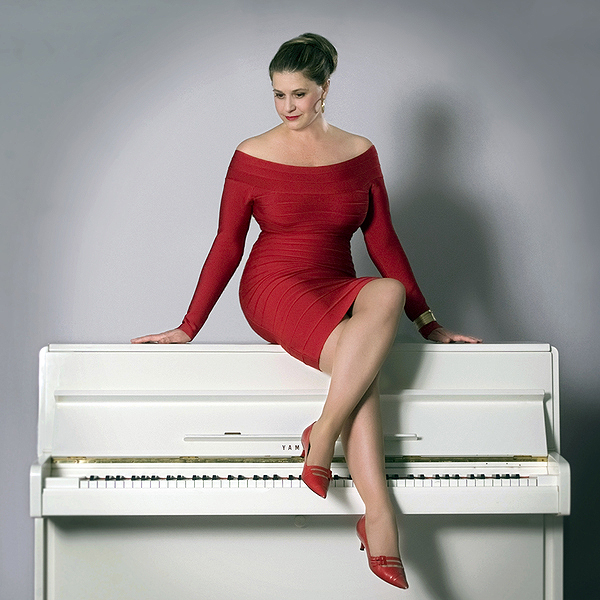
Maria Bacardi does not remember fleeing to Spain from Cuba in 1961 as a political exile. She was just 4 years old.
But what came after that, she described as if it had happened yesterday. On Friday and Saturday nights, hordes of family friends poured into her living room, escaping the cold Madrid air. They opened a bottle of rum and her mother, Elena Gomez del Canto Bacardi, pulled out her guitar. And then they began to sing.
They sang songs of love. They sang songs of loss. They sang songs of pain. They sang songs of their homeland—a country they yearned for, a place they would never see again.
“My mother didn’t sing them to me directly, I caught them in the air,” Ms. Bacardi recalled during a telephone interview last week. “They sang to all hours of the morning, crying desperately for their return to Cuba. Crying desperately. I didn’t realize I was living their trauma. I realized, many years later, it became the core of my artistry and my passion and my devotion for art and beauty.”
These were the hundreds of songs that shaped her childhood, Ms. Bacardi explained, and 13 of them comprise her debut, a Cuban Bolero solo album, “Deseo”—marking both a professional and personal reinvention—that will be released by Breaking Records in March.
Fans of her longtime theatrical and artistic work know the part-time East Hampton resident as Maria Pessino. Now, she is Maria Bacardi—paying homage to her maternal grandmother’s name and her family’s legacy in the world of liquor and spirits.
“It started with my great-great-great grandpa—Facundo Bacardi—as a poor immigrant coming from Catalonia, Spain, like many other immigrants looking for the fortune in the colonies, in Cuba,” the singer said. “He decided he wanted to make a rum that was not a terrible rum that the pirates would drink that you’d have to spit out, but a rum that was smooth and transparent.”
When he wasn’t working his day job in a general merchandise store, Mr. Bacardi could be found in a small shack, distilling and experimenting, she said. His son, Facundo Bacardi Jr., took over the family business and remained focused through bouts of cholera and tumultuous wars, she reported, until Bacardi rum became what it is today: the second-largest liquor company in the world, of “incredible, mind-boggling corporate magnitude,” she said.
It is a story that has always inspired Ms. Bacardi. One that has taught her to never stop trying and push for success.
“I’m 55, but I feel like I’m 15, if I didn’t have such neck pains,” she laughed. “I believe one either has to give up or reinvent oneself. So it’s a reinvention. And I hope to bring as tender and as soothing and as engaging and maybe even a challenging quality to my music, to those who listen to me, as what I am experiencing while I’m singing.”
Ever since Ms. Bacardi was a young girl, she said she was destined for the stage. She began with fine art in Spain and moved to Manhattan in 1977 to pursue acting.
“The Sex Pistols were screaming,” she said. “And they’re still my fave. My music taste is very wide. I was 20 and I came here because I wanted to be in the capital of the arts of the world. I didn’t want to do anything that was tried and true. I wanted to take a chance with everything I was doing. America has wider skies and you can still be who you are here. Now, once a New Yorker, always a New Yorker.”
In 1990, Ms. Bacardi moved to East Hampton and, a year later, launched her own not-for-profit theater company, Oddfellows Playhouse, which promotes new work and uses alternative indoor and outdoor stages across the East End. She also continues to work closely with Robert Wilson at the Watermill Center, she said.
Though she now lives thousands of miles from her Cuban roots, she’s returning to them with a smorgasbord of Bolero songs written from the early 1900s through the 1960s that stray away from hip-grinding Latin salsa, she said.
The tracks include “Yellow Days,” made famous by Frank Sinatra; “Y Tu Que Has Hecho,” which was written by Eusebio Delfin, Ms. Bacardi’s great-granduncle; a French rendition of “Guantanamera,” the most recorded Spanish song in the world, she said; and “Como Fue,” her first single featuring her own English translation.
“I’ve always been in love with these songs because they’re like the Cole Porter songs of Cuba,” she said. “They’re romantic, very slow and you’re supposed to dance them with your partner on a single brick. They’re very close, tight. You barely move. Very sexually suggestive and absolutely brilliantly written.”
These were the songs Ms. Bacardi would listen to on her mother’s records, she said. She knew every scratch on the vinyl. In the 1960s, she listened to her Cuban elders—the women wearing fashionable pointy shoes, little dresses and sporting beehives of the time—sing them, while crying, “When are we going back? When are we going back?” she said. They never did.
Elena Gomez del Canto Bacardi, who is now 87, doesn’t sing those songs of Cuba anymore. About a year and a half ago, she had a tracheotomy, her daughter explained. And curiously, that is exactly when the younger Ms. Bacardi reinvented herself—when her mother’s vocal chords stopped working.
“When I’m singing, she moves her little foot and her little hand, like she still knows the song,” Ms. Bacardi said. “And she gestures to her eyes, like she’s crying. She’s never returned to Cuba. And she never will because her heart would be broken.”